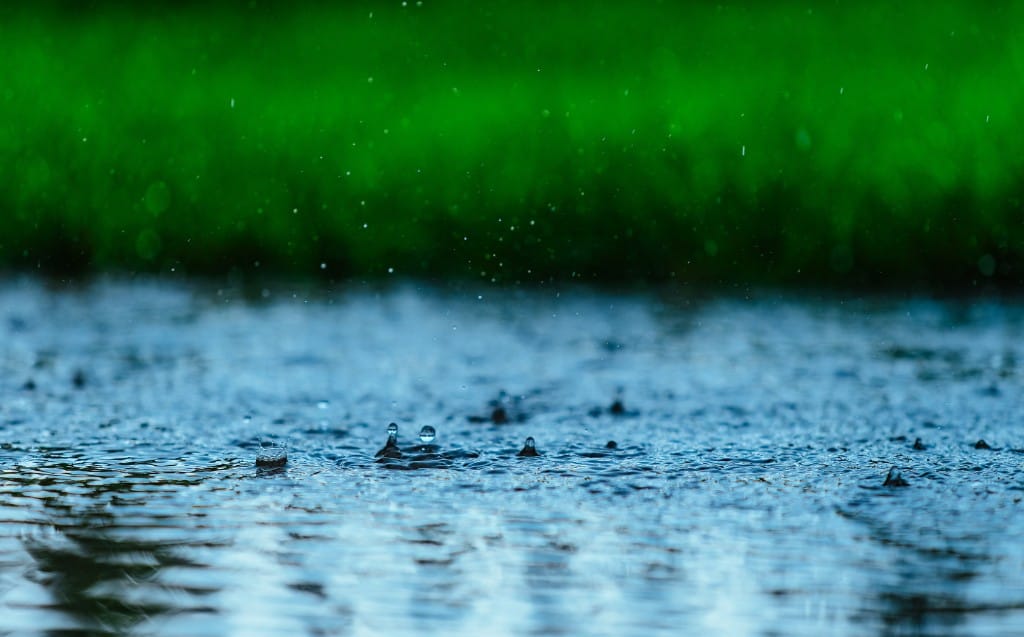
Not only have energy costs but water costs also risen significantly in the face of inflation. If you have a garden pond, you always need to ensure a supply of fresh water. During the summer months when water evaporates, you need to refill the pond. During pond cleaning, you replace a large portion of the water. It may seem tempting to collect rainwater or direct it into the pond since it’s considered clean, natural, and costs nothing. After all, your pond is exposed to various weather conditions. Rainwater is also beneficial for your garden beds. Read this article to find out if rainwater is good or bad for the pond.
Please avoid using rainwater for the garden pond!
It’s a misconception that rainwater is good for the garden pond. Please do not use it, as it can even be harmful to the fish. While it’s rich in oxygen, rainwater contains few minerals and is not as clean as you might think. Rainwater can be contaminated, especially when it’s directed into the pond via the roof gutter or a rain barrel. Rainwater is created when water evaporates. During its ascent and descent as rain, it passes through the Earth’s atmosphere, picking up pollutants and dirt particles. These contaminants end up in your garden pond, where they promote algae growth.
What to do during heavy rain and prolonged rainy periods?
You may argue that you can’t prevent rainwater from entering your pond since there can be heavy rains and prolonged rainy periods. That’s absolutely correct. A large garden pond with a healthy ecosystem can generally compensate for this, especially if you have many plants in your pond. Nonetheless, you should compensate for the water quality, as excessive rain can damage the delicate ecosystem. You can daily check the water quality with test strips or a droplet test and, if necessary, take appropriate countermeasures:
- Remove all impurities like leaves, pollen, or small branches to counteract algae and sludge formation.
- If immediate action isn’t necessary, wait a few days for the suspended particles to settle. If needed, remove the sludge with a sludge vacuum.
- Use a skimmer, clean its collection basket and pollen sponge.
- If the water quality deteriorates, you can use our products, such as phosphate binders, algae killers, or sludge removers.
Consider carbonate hardness (KH) of the water
Pay particular attention to the carbonate hardness (KH) in the water, which can significantly decrease with the influx of rainwater. The KH should be between 5 and 10. You can use an appropriate pond care product to replenish minerals and increase the KH in the pond. In some cases, water replacement may be useful. Replace a portion of the pond water and refill it with hard tap water.
Risk of an acid crash after heavy rain
After heavy rain, the risk of an acid crash in your garden pond should not be underestimated. An acid crash occurs when the carbonate hardness decreases significantly. Typically, pond water is alkaline with a pH value between 7.5 and 8.5. During heavy rain, the water can turn acidic, with a pH value as low as 4.0. This is detrimental to your fish, especially to sensitive koi. Acidic water also affects filter bacteria, as they lack nutrients in acidic water, which hampers the pond filter’s operation. This risk mainly applies to smaller ponds. Therefore, act promptly after heavy rainfall and replenish the water with minerals or replace a portion of it.
Why you shouldn’t direct rainwater into the pond
You should refrain from directing rainwater from the roof gutter into the pond or supplying water from a rain barrel. This is because rainwater carries contaminants from the atmosphere and, in addition, brings more contaminants into the pond when it flows through the roof and gutter. Pollen, leaves, needles, or bird droppings that accumulate on the roof end up in your pond. This promotes algae growth and the formation of sludge.
You should also avoid using water from the rain barrel for your pond, as it is contaminated after passing through the roof and gutter. Algae may already accumulate in the rain barrel. If the rain barrel is not covered, it provides favorable conditions for mosquitoes to lay their eggs, potentially leading to a nuisance of mosquito larvae in your garden pond.
How to use rainwater nonetheless
You can collect rainwater in a rain barrel or an underground tank to use it in the garden. Cover the rain barrel to prevent mosquitoes from laying eggs in it and foreign objects from entering the water. Various plants like cucumbers or tomatoes benefit from rainwater and can be watered with it.
Regularly monitor the water parameters in your garden pond. Sometimes, the carbonate hardness may be too high, in which case rainwater can be useful as it decreases the KH. However, pass rainwater through a filter before using it to ensure cleanliness.
The suitable water for the garden pond
If you need to renew the water in the garden pond, replace a portion of it, or top it up, it’s best to use tap water. Tap water has higher carbonate hardness and is richer in minerals. Groundwater is also less suitable for the garden pond. Install an additional water meter outdoors to save water costs; it counts only fresh water and not wastewater.
Conclusion:
Rainwater is not suitable for the garden pond. While it is cost-free and rich in oxygen, it lacks essential minerals. The carbonate hardness can significantly decrease with rainwater. During long periods of rain or heavy rainfall, the carbonate hardness or pH level can also decrease. Use tap water or pond care products to increase the pH level and carbonate hardness when necessary. Avoid using water from the roof gutter or rain barrel for your garden pond, as it promotes algae growth and can harm fish. Tap water is the best option for your garden pond.